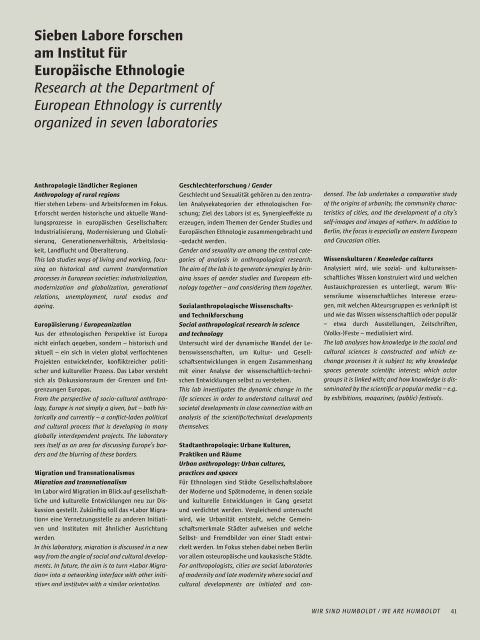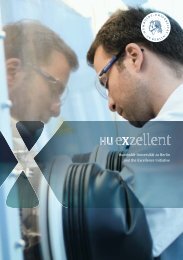hu wissen (pdf) - Exzellenzinitiative - Humboldt-Universität zu Berlin
hu wissen (pdf) - Exzellenzinitiative - Humboldt-Universität zu Berlin
hu wissen (pdf) - Exzellenzinitiative - Humboldt-Universität zu Berlin
Erfolgreiche ePaper selbst erstellen
Machen Sie aus Ihren PDF Publikationen ein blätterbares Flipbook mit unserer einzigartigen Google optimierten e-Paper Software.
Sieben Labore forschen<br />
am Institut für<br />
Europäische Ethnologie<br />
Research at the Department of<br />
European Ethnology is currently<br />
organized in seven laboratories<br />
Anthropologie ländlicher Regionen<br />
Anthropology of rural regions<br />
Hier stehen Lebens- und Arbeitsformen im Fokus.<br />
Erforscht werden historische und aktuelle Wandlungsprozesse<br />
in europäischen Gesellscha� en:<br />
Industrialisierung, Modernisierung und Globalisierung,<br />
Generationenverhältnis, Arbeitslosigkeit,<br />
Landfl ucht und Überalterung.<br />
This lab studies ways of living and working, focusing<br />
on historical and current transformation<br />
processes in European societies: industrialization,<br />
modernization and globalization, generational<br />
relations, unemployment, rural exodus and<br />
ageing.<br />
Europäisierung / Europeanization<br />
Aus der ethnologischen Perspektive ist Europa<br />
nicht einfach gegeben, sondern – historisch und<br />
aktuell – ein sich in vielen global verfl ochtenen<br />
Projekten entwickelnder, konfl iktreicher politischer<br />
und kultureller Prozess. Das Labor versteht<br />
sich als Diskussionsraum der Grenzen und Entgren<strong>zu</strong>ngen<br />
Europas.<br />
From the perspective of socio-cultural anthropology,<br />
Europe is not simply a given, but – both historically<br />
and currently – a confl ict-laden political<br />
and cultural process that is developing in many<br />
globally interdependent projects. The laboratory<br />
sees itself as an area for discussing Europe’s borders<br />
and the blurring of these borders.<br />
Migration und Transnationalismus<br />
Migration and transnationalism<br />
Im Labor wird Migration im Blick auf gesellscha� -<br />
liche und kulturelle Entwicklungen neu <strong>zu</strong>r Diskussion<br />
gestellt. Zukün� ig soll das »Labor Migration«<br />
eine Vernet<strong>zu</strong>ngsstelle <strong>zu</strong> anderen Initiativen<br />
und In stituten mit ähnlicher Ausrichtung<br />
werden.<br />
In this laboratory, migration is discussed in a new<br />
way from the angle of social and cultural developments.<br />
In future, the aim is to turn »Labor Migration«<br />
into a networking interface with other initiatives<br />
and institutes with a similar orientation.<br />
Geschlechterforsc<strong>hu</strong>ng / Gender<br />
Geschlecht und Sexualität gehören <strong>zu</strong> den zentralen<br />
Analysekategorien der ethnologischen Forsc<strong>hu</strong>ng;<br />
Ziel des Labors ist es, Synergieeff ekte <strong>zu</strong><br />
erzeugen, indem Themen der Gender Studies und<br />
Europäischen Ethnologie <strong>zu</strong>sammengebracht und<br />
-gedacht werden.<br />
Gender and sexuality are among the central categories<br />
of analysis in anthropological research.<br />
The aim of the lab is to generate synergies by bringing<br />
issues of gender studies and European ethnology<br />
together – and considering them together.<br />
Sozialanthropologische Wissenscha� s-<br />
und Technikforsc<strong>hu</strong>ng<br />
Social anthropological research in science<br />
and technology<br />
Untersucht wird der dynamische Wandel der Lebens<strong>wissen</strong>scha�<br />
en, um Kultur- und Gesellscha�<br />
sentwicklungen in engem Zusammenhang<br />
mit einer Analyse der <strong>wissen</strong>scha� lich-technischen<br />
Entwicklungen selbst <strong>zu</strong> verstehen.<br />
This lab investigates the dynamic change in the<br />
life sciences in order to understand cultural and<br />
societal developments in close connection with an<br />
analysis of the scientifi c/technical developments<br />
themselves.<br />
Stadtanthropologie: Urbane Kulturen,<br />
Praktiken und Räume<br />
Urban anthropology: Urban cultures,<br />
practices and spaces<br />
Für Ethnologen sind Städte Gesellscha� slabore<br />
der Moderne und Spätmoderne, in denen soziale<br />
und kulturelle Entwicklungen in Gang gesetzt<br />
und verdichtet werden. Vergleichend untersucht<br />
wird, wie Urbanität entsteht, welche Gemeinscha�<br />
smerkmale Städter aufweisen und welche<br />
Selbst- und Fremdbilder von einer Stadt entwickelt<br />
werden. Im Fokus stehen dabei neben <strong>Berlin</strong><br />
vor allem osteuropäische und kaukasische Städte.<br />
For anthropologists, cities are social laboratories<br />
of modernity and late modernity where social and<br />
cultural developments are initiated and con-<br />
densed. The lab undertakes a comparative study<br />
of the origins of urbanity, the community characteristics<br />
of cities, and the development of a city’s<br />
self-images and images of »other«. In addition to<br />
<strong>Berlin</strong>, the focus is especially on eastern European<br />
and Caucasian cities.<br />
Wissenskulturen / Knowledge cultures<br />
Analysiert wird, wie sozial- und kultur<strong>wissen</strong>scha�<br />
liches Wissen konstruiert wird und welchen<br />
Austauschprozessen es unterliegt, warum Wissensräume<br />
<strong>wissen</strong>scha� liches Interesse erzeugen,<br />
mit welchen Akteursgruppen es verknüp� ist<br />
und wie das Wissen <strong>wissen</strong>scha� lich oder populär<br />
– etwa durch Ausstellungen, Zeitschri� en,<br />
(Volks-)Feste – medialisiert wird.<br />
The lab analyses how knowledge in the social and<br />
cultural sciences is constructed and which exchange<br />
processes it is subject to; why knowledge<br />
spaces generate scientifi c interest; which actor<br />
groups it is linked with; and how knowledge is disseminated<br />
by the scientifi c or popular media – e.g.<br />
by exhibitions, magazines, (public) festivals.<br />
WIR SIND HUMBOLDT / WE ARE HUMBOLDT<br />
41



